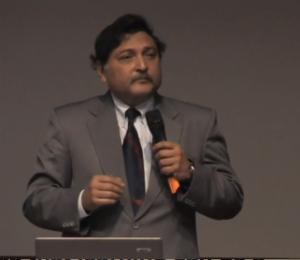http://www.ted.com/talks/sugata_mitra_shows_how_kids_teach_themselves
Sugara Mitra , Inde, TED, 2007, 20:59, sub in 30 languages
 Speaking at LIFT 2007, Sugara Mitra presents his Hole in the Wall project. Young kids in this project figured out how to use a PC in english on their own — and then taught other kids. He asks, what else can children teach themselves?
Speaking at LIFT 2007, Sugara Mitra presents his Hole in the Wall project. Young kids in this project figured out how to use a PC in english on their own — and then taught other kids. He asks, what else can children teach themselves?
Educational researcher Sugata Mitra is the winner of the 2013 TED Prize. His wish: Build a School in the Cloud, where children can explore and learn from one another. He demonstrates that learning can be a self-organised system as long as collective interactions are able to fuel the system.
Educational researcher Dr. Sugata Mitra’s “Hole in the Wall” experiments have shown that, in the absence of supervision or formal teaching, children can teach themselves and each other, if they’re motivated by curiosity and peer interest. In 1999, Mitra and his colleagues dug a hole in a wall bordering an urban slum in New Delhi, installed an Internet-connected PC, and left it there (with a hidden camera filming the area). What they saw was kids from the slum playing around with the computer and in the process learning how to use it and how to go online, and then teaching each other.
The “Hole in the Wall” project demonstrates that, even in the absence of any direct input from a teacher, an environment that stimulates curiosity can cause learning through self-instruction and peer-shared knowledge. Mitra, who’s now a professor of educational technology at Newcastle University (UK), calls it “minimally invasive education.”
At TED2013, Sugata Mitra made a bold TED Prize wish: Help me build a place where children can explore and learn on their own — and teach one another — using resouces from the worldwide cloud.
